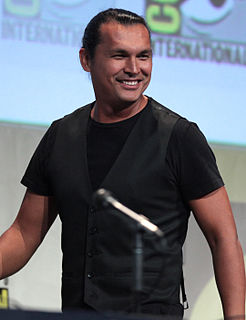A Quote by Nicolas Cage
I always see America as really belonging to the Native Americans. Even though I'm American, I still feel like a visitor in my own country.
Related Quotes
You see the one thing I've always maintained is that I'm an American Indian. I'm not a Native American. I'm not politically correct. Everyone who's born in the Western Hemisphere is a Native American. We are all Native Americans. And if you notice, I put American before my ethnicity. I'm not a hyphenated African-American or Irish-American or Jewish-American or Mexican-American.
What we did in the 1960s and early 1970s was raise the consciousness of white America that this government has a responsibility to Indian people. That there are treaties; that textbooks in every school in America have a responsibility to tell the truth. An awareness reached across America that if Native American people had to resort to arms at Wounded Knee, there must really be something wrong. And Americans realized that native people are still here, that they have a moral standing, a legal standing. From that, our own people began to sense the pride.
I too have a certain idea of America. Moreover, I would not feel entitled to say that of any other country, except my own. This is not just sentiment, though I always feel ten years younger – despite the jet-lag – when I set foot on American soil: there is something so positive, generous, and open about the people – and everything actually works. I also feel, though, that I have in a sense a share of America.
I have four relatively small children, and around fourth grade, they start doing big projects on Native Americas: everything is Native Americans in elementary school. Do you know how many Native American dresses I've sewn, on and on; it's a full yearlong study. And then never again. As journalists, we never even cover Native Americans.
It may be the optimist in me, but I think America has a uniquely powerful and capacious glue internally. The American identity has always been ethnically and religiously neutral, so within one generation you have Italian-Americans, Irish-Americans, Chinese-Americans, Jamaican-Americans - they feel American. It's a huge success story.
Though women may appear equal in some ways, and though we definitely have accomplished a lot, the fact is one in one women will still experience sexual violence at some point in their lives; a mere 17 percent of the U.S. Senate is female; women still only make 77 cents for every man's dollar - and that's not even taking into consideration global issues like sex trafficking or honor killings. We still need feminism, it's just not as easy for people - especially people in an incredibly privileged country like America - to always see that.
I see Americans of every party, every background, every faith who believe that we are stronger together: black, white, Latino, Asian, Native American; young, old; gay, straight; men, women, folks with disabilities, all pledging allegiance under the same proud flag to this big, bold country that we love. That's what I see. That's the America I know!
The occupation of America (and Columbus's arrival quite clearly was an occupation, no one can deny that) meant that the entire history of the Native Americans was rendered invisible. The land could only be occupied if it was first defined as empty. So it was defined as a wilderness, even though it had been used by native people for millennia.
We [Americans] have a historical trauma when it comes to the past relationships when it comes to Native Americans and the history of how America was created. With this film, it's nice to see that the trauma is presented from a white male that was in the Civil War and that trauma affects him in a way that still exists.
There's no doubt that when it comes to our treatment of Native Americans as well as other persons of color in this country, we've got some very sad and difficult things to account for. I personally would want to see our tragic history, or the tragic elements of our history, acknowledged. I consistently believe that when it comes to whether it's Native Americans or African-American issues or reparations, the most important thing for the U.S. government to do is not just offer words, but offer deeds.
Klinsmann should be remembered as a great coach; I don't think a lot of people see it, but as players, we really appreciate what he did for America soccer. He opened American soccer up. He gave it a lot more variety of players. You see German-Americans and Mexican-Americans, and you see the guys that were born in America.



































